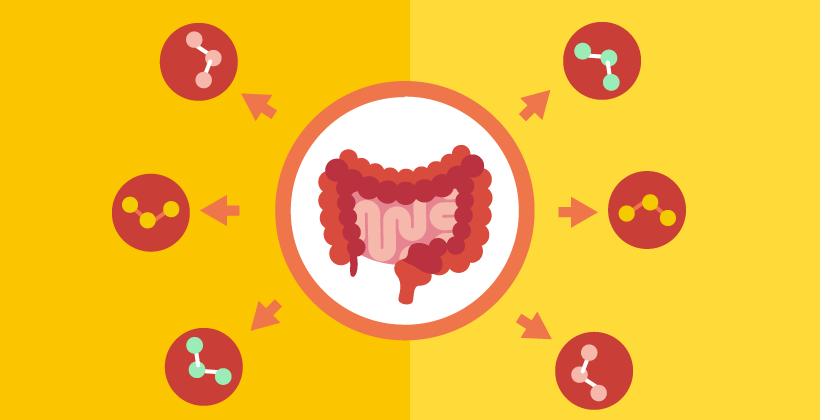Gut microbiota linked to obesity and mental disorders EU-funded project ‘MyNewGut’ finds
Last Updated : 17 December 2018After five years of investigation, the EU project ‘MyNewGut’, comprising thirty organisations from fifteen countries, has released its scientific results on the role played by the gut microbiota on physical and mental health.

MyNewGut Project partners at the last MyNewGut Consortium meeting held on 17.10.2018 in Brussels.
The research findings were presented during the final conference held on 18.10.2018 at the Stanhope Hotel in Brussels and will play a key role in the future development of more effective interventions targeting the gut — fighting obesity, metabolic syndrome, and behavioural disorders, like eating and emotional disorders.
New gut bacteria may help fight obesity and mental disorders
The MyNewGut project has discovered new bacterial species and strains in healthy people that seem to be effective against obesity, metabolic and mental disorders related to stress and obesity (e.g. depression). They do so by influencing the endocrine and immune pathways that have an impact on both our physical and mental health.
The bacterial strain ‘Bacteroides uniformis CECT 7771’ has shown pre-clinical efficacy on metabolic and immune dysfunctions in obesity, for example reducing serum triglyceride levels, glucose intolerance and body weight gain as well as inflammation.
Bifidobacterium pseudocatenulatum CECT 7765 was shown to reduce depressive-like behaviour associated with obesity in pre-clinical trials. A Bifidobacterium longum strain has been demonstrated to have a positive impact on perceived stress, sleep quality and cortisol release in a double-blinded placebo-controlled intervention trial in humans.
These strains could potentially be next generation probiotics that could in the future be used to help tackle obesity and depression.
How diet has an influence on the gut microbiota
Diet appears to be a major factor that influences the composition of the human gut microbiota.
MyNewGut experts have conducted several human intervention trials to investigate dietary health effects potentially mediated by the microbiota and they are publishing a range of position papers that will show evidence on how we could inform future dietary recommendations.
MyNewGut partners have specifically looked into the role played by proteins, fats and fibres on the gut microbiota.
High intake of proteins or a high fat diet may harm the gut microbiota
MyNewGut partners found out that high protein consumption, which increases protein fermentation in the large intestine, generates some of the toxic metabolites (products of metabolism) linked to diseases such as colorectal cancer.
A high fat diet, especially when rich in saturated fatty acids may have negative effects on the gut microbiota, characterised by a lower number of microbes and a lower variety of microbial species. High-fat diets rich in omega 3 or omega 6 polyunsaturated fatty acids do not seem to negatively affect the microbiota, whereas the effects of monounsaturated fatty acids are less consistent.
High fat diets are associated with depression
Studies of the MyNewGut partners showed that Western diets rich in saturated fat resulted not only in obesity, but also in depression-like behaviour. The depression-like behaviour associated with diet-induced obesity depended on the gut microbiome, because the effects were blunted by antibiotic-treatment. In high-fat diet fed mice, using the same mouse model, MyNewGut also showed that a bacterial strain (Bifidobacterium pseudocatenulatum CECT 7765) reduces depressive-like behaviour associated with obesity, acting through the gut-brain axis.
These results are only a starting point, and new research would have to confirm the findings in humans.
The role of the gut in metabolic health
Studies in animal models conducted by project partners have revealed new mechanisms whereby the microbiota could impact metabolic health.
MyNewGut partners showed that peptidase activity (DPPIV) responsible for the degradation of enteroendocrine hormones produced in the gut, which regulate appetite and glucose homeostasis (like glucagon-like peptide I [GLP-I]), are of bacterial origin.
This means that the presence of specific bacteria producing these new enzymes can adversely influence appetite, food intake and body weight gain.
Gut microbiota: we are all different
The MyNewGut project has also explored innovative interventions, including Faecal Microbiota Transplants (FMT) for restoring dysbiosis-associated disorders. In FMT, the microbiota of a healthy donor is transferred to an individual suffering from some form of dysbiosis.
In MyNewGut studies, the donor’s microbiota was transferred to human subjects with metabolic syndrome. In these studies, the responsiveness to treatment depended on the individual’s gut microbiota profile, suggesting a need for personalised intervention strategies.
This study demonstrates that the individual’s microbiota directly impacts neural systems that could mediate the impact of food intake on metabolic health.
The impact of early life microbial imbalance on health
MyNewGut partners investigated whether effects of environmental factors in early life and childhood also impact health outcomes in later stages of life in humans. For example, they conducted a longitudinal study in children to determine the role of the microbiota, the lifestyle (diet, exercise, etc.) and other individual factors (immune and metabolic profile) in the development of overweight.
The study revealed that specific microbiota configurations were indeed correlated to inflammatory markers and dietary patterns, and subsequently to the development of obesity.
MyNewGut has also discovered that dietary changes which favourably influence the microbiota may have a higher and longer-lasting effect during stages of development, and this emphasises the importance of diet during early life for long-term health in adulthood.
Quote
Prof. Yolanda Sanz, coordinator of the project and Professor at the Spanish National Research Council, said that “a substantial progress has been made in the understanding of the causal role of the microbiota and its interactions with diet and lifestyle in metabolic and mental health. The data and the products generated by the project represent innovative solutions and can inspire the industries to pursue future developments in this field. These can also support policies and recommendations to promote a healthier lifestyle”.
Background notes
The MyNewGut project (Microbiome's influence on energy balance and brain development/function put into action to tackle diet-related diseases and behaviour) has received funding from the European Union’s Seventh Framework Programme for research, technological development and demonstration. Grant Agreement no: 613979.
Links
Contacts
|
Bettina Schelkle |
Davide Carrino |



